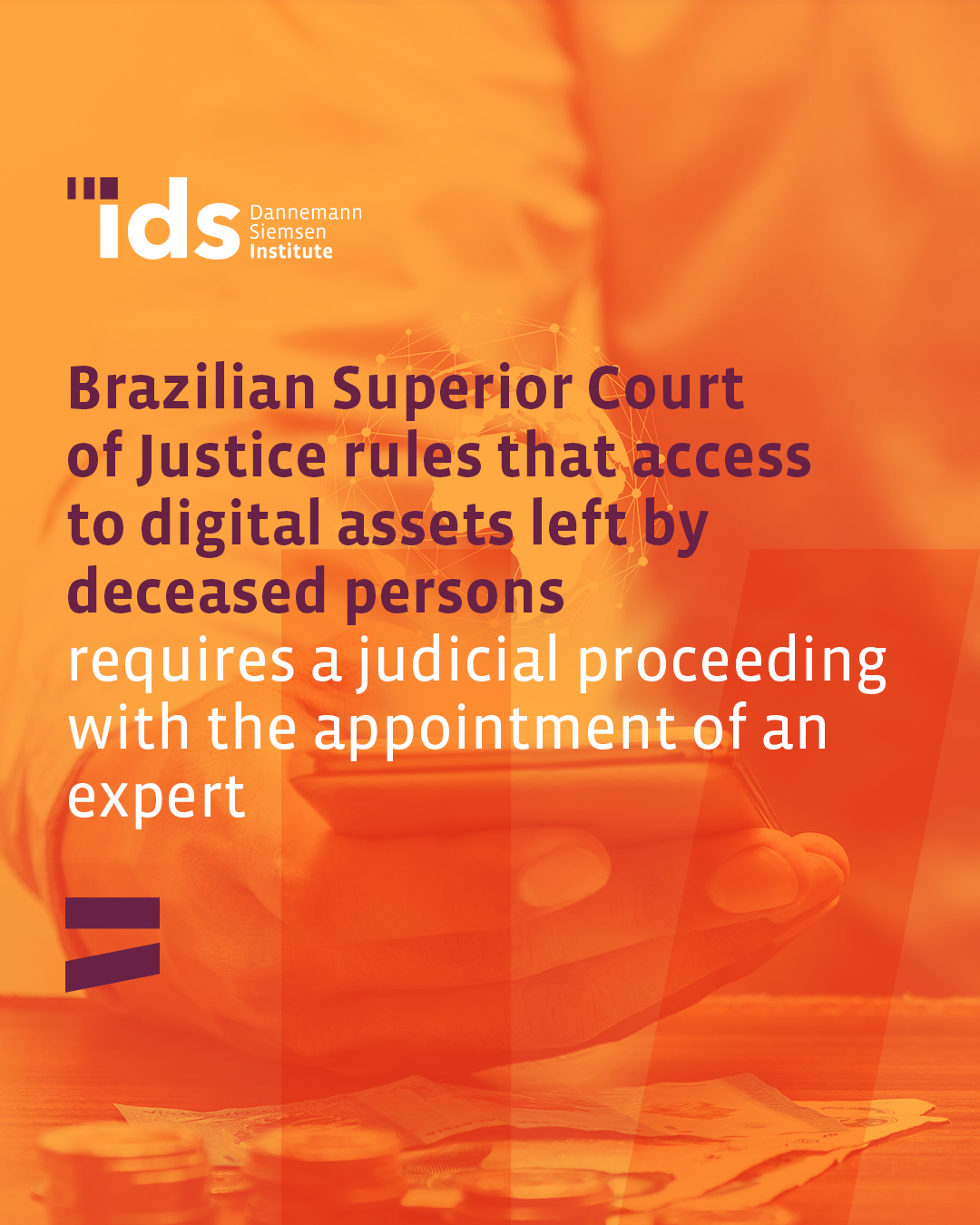14 de outubro de 2025
Share
Brazilian Superior Court of Justice rules that access to digital assets left by deceased persons requires a judicial proceeding with the appointment of an expert
On September 9, the Third Panel of the Brazilian Superior Court of Justice (STJ) held, by majority, that access to digital content stored on devices belonging to deceased persons must occur through the opening of a specific procedural incident within the probate proceedings, with the appointment of a technical expert responsible for identifying, classifying, and assessing the data under judicial supervision. The decision represents a landmark in the judicial treatment of so-called digital inheritance and may directly affect probate cases involving social media accounts, cloud storage, digital wallets, intellectual works, and other assets protected by passwords or stored on electronic devices.
The controversy originated from an estate proceeding related to the simultaneous death of a married couple. The heirs claimed that the deceased had used tablets to manage their assets and store relevant information concerning the family’s property. After a first official request was sent to the company responsible for the digital devices — whose response was deemed overly technical and difficult to understand — the heirs requested that a new official letter be issued to enable access to the digital content stored on the devices
The trial court denied the request, holding that analyzing the response provided by the company responsible for the digital devices would require broader technical evidence, exceeding the scope of the probate proceedings. According to the decision, the court’s role was limited to verifying ownership of the devices, not examining their content, which should be addressed in a separate action. The São Paulo Court of Justice (TJSP) upheld this understanding by denying the interlocutory appeal, considering that the matter involved a complex legal question (“questão de alta indagação”).
The matter reached STJ through Special Appeal No. 2.124.424, in which the controversy centered on two main issues: (i) whether the identification of digital assets constitutes a complex issue requiring separate proceedings under Article 612 of the Code of Civil Procedure; and (ii) whether the estate administrator could be granted unrestricted access to the digital content.
Justice Nancy Andrighi, the reporting judge, granted the appeal in part, rejecting the view that the issue constituted a complex issue requiring separate proceedings and holding that the request could be processed within the probate proceedings. She emphasized, however, that unrestricted access to the devices’ contents could infringe rights of personality.
In her opinion, the Judiciary cannot authorize companies to grant unrestricted access to their clients’ data, particularly where the deceased left no passwords or explicit instructions during their lifetime. According to Justice Andrighi, it is necessary to balance heirs’ rights of succession with the constitutional and civil law protections of the deceased’s memory and privacy.
She therefore proposed the establishment of an incidental proceeding attached to the probate case, with the appointment of a technical expert referred to as a “digital administrator of the estate,” charged with accessing the devices, compiling a complete inventory of their contents, and submitting this to the court for a subsequent ruling on which items are transmissible.
In a dissenting vote, Justice Ricardo Villas Bôas Cueva argued for granting the appeal in full, without the need for an incidental proceeding or expert appointment. In his view, digital assets should be treated as ordinary assets and subjected to the principle of universal succession set forth in Article 1.784 of the Civil Code.
The majority, however, sided with the reporting justice, finding that the complexity of contemporary digital life—in which assets such as social media accounts may constitute significant economic value—requires a framework that reconciles patrimonial transmission with the preservation of constitutional values, pending specific legislative regulation. Accordingly, the Third Panel held that access to digital assets cannot be unrestricted or automatic but must be subject to judicial filtering and specialized technical oversight, including safeguards for third parties whose personal information may appear in the contents.
The reporting justice, however, emphasized that the proposed measure is of a transitional nature, intended to fill the legislative gap regarding access to the digital assets owned by a deceased person who has not left a password or an appointed administrator for such assets. It is, therefore, a provisional procedural solution, applicable until a specific law is enacted to regulate the procedure for accessing digital assets when the heirs do not possess the deceased’s computer password.
The full text of the judgment is available at: REsp 2.124.424
Note: For quick release, this English version is provided by automated translation without human review.
